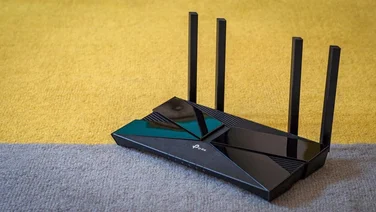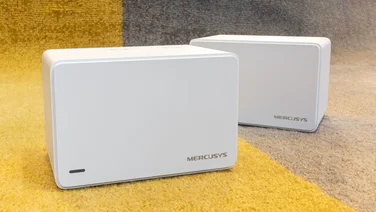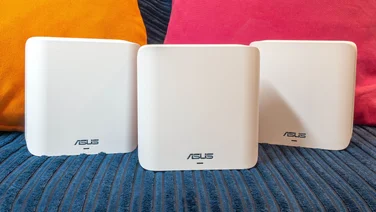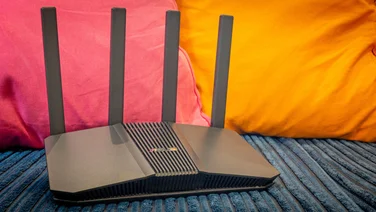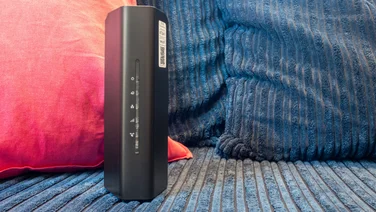To help us provide you with free impartial advice, we may earn a commission if you buy through links on our site. Learn more












- Proper tri-band design with MLO
- Faster than similarly priced rivals
- Easy to manage with a decent feature set
- Full security and parental control features cost extra
- Doesn’t fully deliver on Wi-Fi 7’s performance potential
The TP-Link Archer BE550 is a serious-looking Wi-Fi 7 router with an impressive specification. In fact, going by its advertised capabilities you might expect it to cost around £300 – but to my surprise and delight, it’s currently available online for just £180. For that money, it’s fantastically well specified.
While the Archer BE550 offers fast Wi-Fi and clever software features, it’s not necessarily the ideal choice for everyone. For basic home needs, a more modest router will serve perfectly well – for example, the Asus RT-BE58U does a more than adequate job for £70 less. Or, if you’re looking for the very fastest performance Wi-Fi 7 can muster, you’ll need something pricier, such as the Netgear Nighthawk RS700S. But with tri-band wireless and multiple multi-gigabit Ethernet ports for a very reasonable price, the Archer BE550 hits the Wi-Fi 7 sweet spot like no other router we’ve seen.
TP-Link Archer BE550 Wi-Fi 7 router review: What you need to know
The Archer BE550 is a tri-band router, offering Wi-Fi 7 services on the 2.4GHz, 5GHz, and 6GHz frequency bands. Its 5GHz radio isn’t particularly fast, with a maximum connection speed of 2.9Gbits/sec, but that’s enough bandwidth to handle high-speed downloads, and to share files reasonably swiftly across your local network.
The 6GHz radio is more powerful, with a top speed of 5.8Gbits/sec and support for Wi-Fi 7’s expanded 320MHz channel width – so devices supporting the latest wireless technologies can get a boost, and spare the more limited 5GHz bandwidth for legacy connections.












The Archer BE550 also supports 2.5Gbits/sec Ethernet on all five of its network ports, making it the perfect hub for a high-speed home NAS setup. If you don’t have a dedicated NAS appliance, the inclusion of a 5Gbits/sec USB port means you can conveniently share files directly from the router itself.
As for range, TP-Link doesn’t promise to cover a specific area, and that’s probably wise, as effective coverage will depend greatly on the layout and construction of your home. It does however suggest that this router is suitable for a four-bedroom home, and based on my own tests (see below) that seems reasonable.
Price and competition
The Archer BE550’s most direct competitor is the Netgear Nighthawk RS200, which can be had online for £160. This has a faster 5GHz radio, which gives it slightly better performance with 5GHz clients, but it lacks any 6GHz capability, and thus offers less overall bandwidth than the Archer. It also only has a single 2.5Gbits/sec LAN port; to be fair, we’d normally be happy with that at this price, but the Archer BE550 has raised the bar on that count.
If you’re willing to pay a bit more, you might like to look at the more upmarket Netgear Nighthawk RS300. This ups the price to £240, but adds 6GHz support and matches the TP-Link’s Wi-Fi speeds across all three bands. We’ve found it isn’t as fast as the Archer, however, and it also has more limited software features, so it’s not a persuasive alternative.
For the very fastest wireless experience, Netgear’s top-of-the-line Nighthawk RS700S boasts double the bandwidth of the Archer BE550 on both the 5GHz and 6GHz bands – not to mention 10Gbits/sec Ethernet. However, even though this mighty router has recently seen a price cut, it still costs £600, making it hard to justify for most people.
Looking in the other direction, the Netgear Nighthawk RS100 does a fine job of basic domestic Wi-Fi 7 duties for a tempting £130 – while our recommended Asus RT-BE58U provides similar performance plus loads more features for an even cheaper £110.
You could save even more money by dipping down to a Wi-Fi 6 router: plenty of recent models are fast enough to handle most people’s work and play requirements for years to come. However, now that Wi-Fi 7 is becoming the norm on client devices, we’d tend to recommend that you get on board with the incoming standard, rather than hanging onto the outgoing one.
Features
The Archer BE550 is a distinctive thing. It’s mostly matte black, with a pattern of diamond-shaped indents around the front and top, protruding side walls and a glossy pinched waist. If you think it looks like something out of Star Wars, the impression is only enhanced when you plug it in and a column of bright white LEDs on the front starts to pulse up and down. Personally, I don’t hate it, but I think I’d prefer a slightly less attention-seeking aesthetic. The physical dimensions are a little larger than I’d like too: it stands 203mm tall, with a footprint of 76 x 231mm.
Still, the design is reasonably functional. There are three handy buttons on the front for WPS pairing, toggling the Wi-Fi signal on and off and disabling the showy lights; at the back are your four 2.5GbE LAN ports, plus a 2.5GbE internet socket. The aforementioned USB connector can be used to share an external hard disk over your local network, or indeed across the whole internet; for Mac users it can also be used as a Time Machine backup destination.












TP-Link’s web-based management interface opens with an attractively clean and simple overview of your network – but click through the badge-type buttons across the top and you’ll find quite an extensive set of sub-pages.
These give you plenty of control over the router’s three Wi-Fi radios, including letting you choose whether you want to operate them under a single SSID, or have them broadcast separate names. You can also aggregate the 5GHz and 6GHz networks into a multi-link connection, activate guest networks on each band and enable additional isolated IoT networks on the 2.4GHz and 5GHz bands.












Other optional features include a built-in firewall, and both inbound and outbound VPN support. I particularly appreciate the way the latter lets you bind individual LAN clients to specific server locations. Unlike Asus’ VPN Fusion feature, the TP-Link firmware doesn’t offer native integration with third-party VPN services, but manually entering your connection details isn’t too much of a pain – and since it supports both OpenVPN and WireGuard it should work with almost any provider.
There’s even a basic security scanner, which checks for insecure router settings, and simple parental controls that can block various types of content from kids’ devices and disable their internet access at bedtime.
Smarter features can be unlocked by paying for subscriptions, costing £35 a year for security and £18 a year for parental controls: that’s a lot less than Netgear’s equivalent services, which cost £85 and £50 per year respectively, but it’s not as generous as Asus’ routers, which give you the full feature set for free.












You can also manage the router using TP-Link’s Tether mobile app. This again provides a nice visual overview of the router’s status, with a handy breakdown of which clients are using which networking bands and allows you to adjust some wireless and guest network settings.
The app can’t handle advanced tasks such as managing your IP address pool or setting up port forwarding – that has to be done in a web browser – but this does mean it’s not overloaded with confusing options and submenus.
Performance
To test the Wi-Fi 7 performance of the Archer BE550, I connected my Asustor Drivestor 4 Pro AS3304T NAS appliance to one of its 2.5GE sockets, then connected wirelessly to the router from my test laptop, equipped with an Intel BE200 Wi-Fi 7 networking card. I then took the laptop to various rooms around my home and measured transfer speeds when copying a set of test files to and from the NAS.
Although the Archer comes set up to broadcast a unified network name by default, I elected to split up the bands and test performance on the 5GHz and 6GHz bands separately, to see what sort of performance you can expect with both older clients and the latest upper-band-capable devices. Here’s what I saw with a 5GHz connection; as ever, I’ve included results from competing routers too, to give you a sense of how this compares to the rest of the market.
Although the Archer BE550’s 5GHz radio is only rated at the same 2.9Gbits/sec as the low-end Asus and Netgear routers, I was pleased to see that it delivered significantly faster downloads at close range. This may be down to the fact that the boxy casing contains not four but six sizeable antennas.
In fact, the Archer’s overall download speeds held up respectably against the entire rest of the market. The one blip was in the dining room at the far end of the house; across repeated tests, the Archer consistently stumbled here, compared to most of the competition. Since I saw the same thing with the Netgear Nighthawk RS300, which has the same radio specification, it could well be that this particular wireless chipset simply isn’t a top performer at range.
Whatever the explanation, let’s keep things in perspective. A download rate of 20.8MB/sec is way beyond what you need for everyday gaming, streaming and video calls. In daily use you probably wouldn’t notice any difference at all between using the Archer BE550 and the ultra-fast Netgear Nighthawk RS700S, except when downloading massive game or video files.
On the 6GHz band, meanwhile, there’s literally no comparison between the the Archer BE550 and its sub-£200 competitors – because none of those models support 6GHz networking at all. Impressively, the Archer outpaced the pricier Netgear Nighthawk RS300 for 6GHz download speeds, so if you want to get much faster than the BE550, you’ll need to pay the big bucks for Netgear’s flagship router.
You’ll see that I also tried out the Archer BE550 in multi-link operation (MLO) mode. In theory, combining 5GHz and 6GHz connections together ought to give you enhanced performance, but the results I saw were a mixed bag: close up, the MLO connection was slower than using either the 5GHz or 6GHz band on its own, but once I moved a little further away MLO seemed to deliver a performance advantage. At any rate, having the option means you can always experiment and see what works best in your own home – and if you suffer from heavy interference then an MLO link may be more stable than using 5GHz or 6GHz alone.
TP-Link Archer BE550 Wi-Fi 7 router review: Verdict
The TP-Link Archer BE550 offers strong performance, a good feature set and excellent wired connectivity. Sure, it’s not the fastest router you can buy, but it was never the slowest in any of our tests – and the inclusion of both 5GHz and 6GHz radios means it has more total wireless bandwidth than any other router at this price point.
If you’re looking for the absolute best value in the Wi-Fi 7 router market – or the most powerful and configurable set of software features – then you might be better off with the Asus RT-BE58U, which is both cheaper and smarter (not to mention more compact).
But for busy homes or small offices seeking a middleweight Wi-Fi 7 solution that won’t get overloaded by a growing population of data-hungry wired and wireless clients, the TP-Link Archer BE550 is a superb router that punches well above its price.


